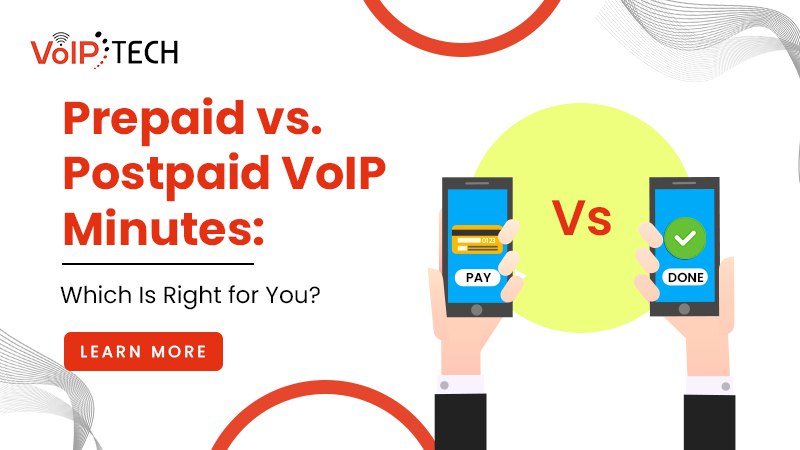Prepaid vs. Postpaid VoIP Minutes: Which Is Right for You?

In today's fast-paced world, businesses and individuals rely heavily on Voice over Internet Protocol (VoIP) services for communication. Whether you're a small business owner, a call center manager, or an individual seeking cost-effective communication solutions, choosing between prepaid and postpaid VoIP minutes is a critical decision. But which option suits your needs best? Let’s explore the key differences and help you make an informed choice.
What Are Prepaid VoIP Minutes?
Prepaid VoIP minutes require you to purchase a set amount of
minutes in advance. Once you consume your minutes, you'll need to top up your
account to continue making calls. This option is popular among businesses and
individuals who prefer budget control and flexibility.
Advantages of Prepaid VoIP:
- Cost
Control: You can allocate a specific budget and avoid unexpected
charges.
- Flexibility:
Pay only for what you need, with no long-term commitments.
- No
Credit Checks: Since you pay upfront, there's no need for credit
verification.
- Ideal
for Short-Term Needs: Perfect for temporary projects or seasonal
businesses.
Disadvantages of Prepaid VoIP:
- Limited
Usage: Once your minutes run out, you must recharge to continue usage.
- Higher
Per-Minute Cost: Prepaid plans may have slightly higher rates compared
to postpaid options.
- Potential
Service Interruptions: If you forget to top up, it can lead to
communication disruptions.
What Are Postpaid VoIP Minutes?
Postpaid VoIP minutes allow you to use the service first and
pay later, usually on a monthly billing cycle. This option is ideal for
businesses with predictable call volumes and a steady budget.
Advantages of Postpaid VoIP:
- Continuous
Service: No need to worry about running out of minutes.
- Lower
Rates: Generally, postpaid plans offer lower per-minute rates.
- Convenience:
Monthly billing simplifies accounting and expense management.
- Scalability:
Ideal for growing businesses that need consistent communication.
Disadvantages of Postpaid VoIP:
- Potential
Overages: Exceeding your allocated minutes may result in additional
charges.
- Credit
Checks Required: Providers may require credit verification for
eligibility.
- Commitment:
Usually involves contracts or long-term agreements.
How to Choose Between Prepaid and Postpaid VoIP?
When deciding which option is right for you, consider the
following factors:
- Budget:
If you prefer strict budget control, prepaid is the better choice. For
consistent monthly expenses, postpaid works well.
- Call
Volume: High call volumes may benefit from postpaid plans due to lower
rates, while occasional users may prefer prepaid.
- Flexibility
Needs: If you have fluctuating communication needs, prepaid offers
greater flexibility.
- Commitment
Level: Businesses looking for stability and long-term solutions should
opt for postpaid.
Conclusion
Both prepaid and postpaid VoIP minutes offer distinct
benefits depending on your business needs and financial preferences. If you
prioritize flexibility and budget control, prepaid might be the best
fit. On the other hand, if you need reliability and predictable costs, postpaid
is the way to go. No matter which option you choose, selecting a reliable VoIP
provider with excellent support and competitive pricing is crucial to ensure
seamless communication.



